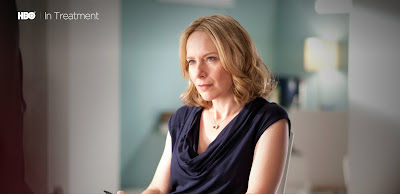
Last time Adele told Paul her door is always open for him – in contrast to his last therapist and mentor Gina. He’s read Gina’s novel, and left her several voice messages, wanting to talk to her about some of the characters in his book. But why would he return to Adele, if he only went to her for a refill of his Ambien? He tells her his twelve-year old son Max has decided to move in with him and came from Baltimore on the train by himself. It’s not so much the pressure of his parental responsibilities that brought him back to Adele. His real concern is how to discuss with Max he has Parkinson’s. He says that as a matter of fact. We know from bits in earlier episodes that Paul did go to a neurologist, and while waiting for the results, has been frantically reading online about the disease’s inheritability risks. When Adele asks him about the neurologist, he interrupts her to admit that she was right he doesn’t really have someone to talk to. He speaks about his relationships with Max and his daughter Rosie, but when Adele asks Paul if he is equally worried about talking to Rosie about his disease, he interrupts her again. Now he thanks her for being right about Gina. Reading her novel makes him realize he disagrees with her methods. He finds her indiscrete and utterly selfish. He starts criticizing Gina, claiming she based her main character on her. But when Adele wants to discuss what bothers him about the book, he breaks her off yet again.
After an awkward silence, she is finally able to get him to talk about the neurologist. He goes on another tantrum about his low-tech encounter at Cornell’s state-of-the-art new hospital wing, only to be told he does not exhibit enough positive symptoms to diagnose the disease. Yet he doesn’t seem relieved. In fact, he has already scheduled another appointment for a second opinion. He still sleeps poorly and continues to have the same dream – running outside a tall fence on a field, but once he approaches the gates his legs get stuck in quicksand, and when he turns around he see his father lurching towards him. Adele pushes Paul to contemplate why he persists in believing he has Parkinson’s even after a qualified neurologist informed his he probably does not have the disease. She wonders if he might find it comforting to imagine there will be people caring for him as he gets older. And she asks him when was the last time he ever felt the same excitement as in his dream when he approached the gates. He becomes angry, feeling misunderstood, and dismisses her expertise again, belittling her as merely a recent graduate without much life experience. He puts her to the test, asking if she understood his reference to Bartleby earlier in the session. She stares blankly at him, hiding her indignation, and responds, “The Scrivener.” She read the Melville novel. She’s past the test. In short, this was a superb episode, masterfully written, and wonderfully acted. A real intellectual treat.
After an awkward silence, she is finally able to get him to talk about the neurologist. He goes on another tantrum about his low-tech encounter at Cornell’s state-of-the-art new hospital wing, only to be told he does not exhibit enough positive symptoms to diagnose the disease. Yet he doesn’t seem relieved. In fact, he has already scheduled another appointment for a second opinion. He still sleeps poorly and continues to have the same dream – running outside a tall fence on a field, but once he approaches the gates his legs get stuck in quicksand, and when he turns around he see his father lurching towards him. Adele pushes Paul to contemplate why he persists in believing he has Parkinson’s even after a qualified neurologist informed his he probably does not have the disease. She wonders if he might find it comforting to imagine there will be people caring for him as he gets older. And she asks him when was the last time he ever felt the same excitement as in his dream when he approached the gates. He becomes angry, feeling misunderstood, and dismisses her expertise again, belittling her as merely a recent graduate without much life experience. He puts her to the test, asking if she understood his reference to Bartleby earlier in the session. She stares blankly at him, hiding her indignation, and responds, “The Scrivener.” She read the Melville novel. She’s past the test. In short, this was a superb episode, masterfully written, and wonderfully acted. A real intellectual treat.

No comments:
Post a Comment
Note: Only a member of this blog may post a comment.